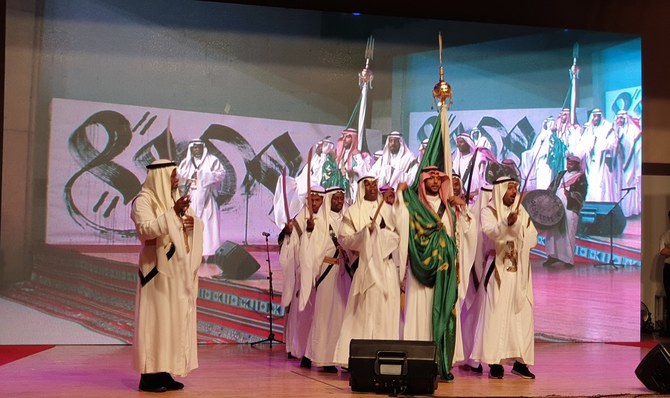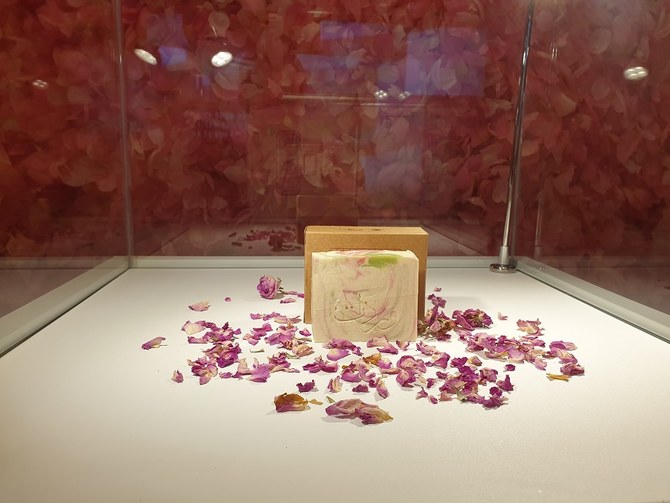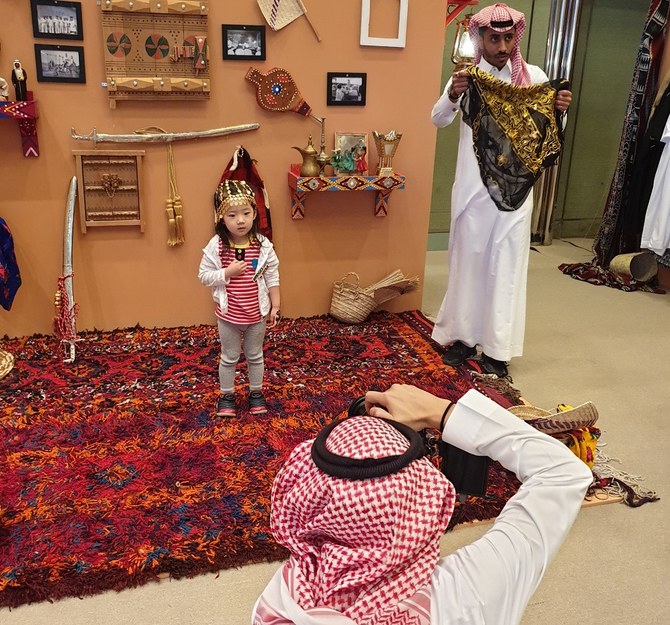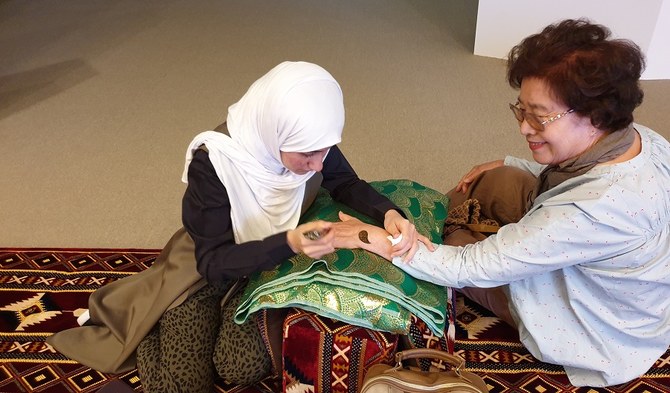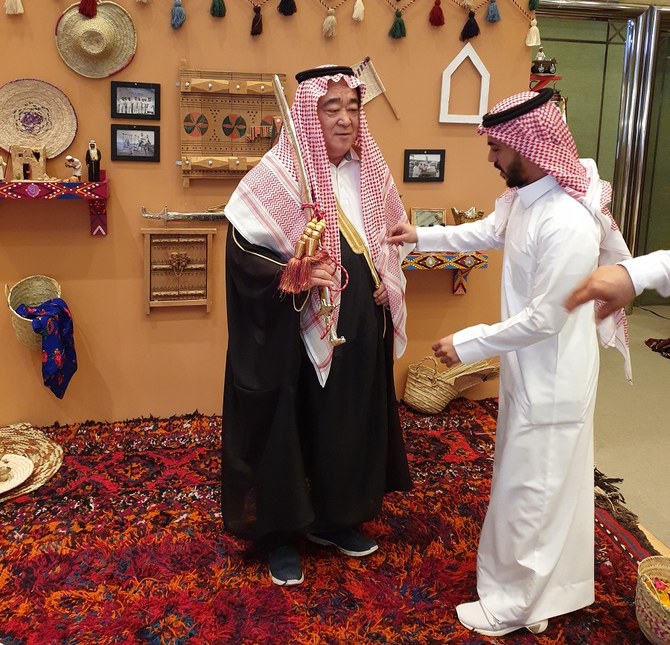SEOUL: A unique cultural festival filled with the music and dance of Saudi Arabia were attracting South Korean visitors at the heart of Seoul Thursday.
The festival is Saudi Arabia’s global cultural campaign titled “Bridges to Seoul” organized by the King Abdualaziz Center for World Culture marking the historical visit of Saudi Crown Prince Mohammed bin Salman to the country in 21 years.
“This Saudi Arabian cultural exhibition is the first in Asia,” Kim Hee-joo, a staffer for Ithra, told Arab News. “This main objective of this campaign is to promote Saudi Arabian cultures in South Korea, many of whose people are still unfamiliar with Saudi cultures despite the close relationship between the two governments.”
The exhibition, which runs from June 24 to July 3, is being held at the convention center of Grand Hilton Seoul. The exhibition offers an opportunity for South Koreans to experience the richness of Saudi culture and heritage.
Visitors can to try on Saudi costumes and accessories for photo sessions and get their Saudi Arabian names written in Arabic script.
“We’re happy to share Saudi cultures with South Koreans. This is a great opportunity for introducing our cultures to South Koreans and bridging cultural gaps between the two countries,” said Muhammed alduhaim at the photo costume booth.
South Korean visitors were enjoying the exhibition with great interest.
“When you talk about Saudi Arabia here, many people including me just think of desert extremely hot weather and something like that,” Choi Bok-nam, 55, said. “However, I’m impressed to see beautiful flower and get to know Saudi’s weather conditions vary after seeing pictures displayed here. I want to travel to Saudi next time.”
For some elder men, who had been in Saudi Arabia for work, the exhibition offered a chance to reminiscent of the old days in Saudi.
“I had worked at Saudi Arabia as an engineer for a year about 30 years ago,” Lim Joo-hwan, 64, said. “This event makes me reminisce about the days in Saudi, and actually I’ve learned new aspects of Saudi cultures here though I lived there just for a year.”
Joo Duk-choon, 76, was fascinated by Taif roses and products made from the local flower.
“I had little knowledge of Saudi Arabia. I thought Saudi was just an oil-rich nation.” he said.
Hanan, 29, from Saudi Arabia said there still need to be communications programs to spread Saudi cultures to South Korea.
“I think South Koreans don’t know about Saudi Arabia as much as Saudi Arabians know about Korea,” said Hannah, who have studied at a Korean university for international studies. “Young generation in Saudi Arabia know much about Korean hallyu (the Korean wave of pop culture), dramas, cultures, but I feel Saudi Arabia doesn’t enough media and stories they can tell to South Koreans.”
She hoped the crown prince’s latest visit to South Korea would be a turning point for getting ever closer between the people of Saudi Arabia and South Korea.
“I feel like the crown prince has made a lot of changes in Saudi, especially for women, media and culture, so I think it’s changing a lot,” she added.
Prince Mohammed spearheads the Vision 2030 economic reform plan aimed at diversifying the Kingdom’s oil dependent economic structure to other industry fields, such as culture and tourism as well as information and communications technology and new sources of energy like hydrogen.
Saudi Arabia seeks to bridge cultural gaps with South Korea
Saudi Arabia seeks to bridge cultural gaps with South Korea

- Seoul welcomed historical visit of Saudi Crown Prince Mohammed bin Salman to the country in 21 years
- A grand cultural exhibition, part of Saudi's global cultural campaign titled “Bridges to Seoul,” to held for Koreans
Saudi House kicks off Davos with push on Vision 2030, AI platform and ‘humanizing’ tourism

- Saudi ministers dominate pre-summit spotlight at Saudi pavilion, touting Vision 2030’s next phase and human capital as key to global edge
- Ministry of Economy and Planning announced the SUSTAIN Platform which aims to accelerate AI-enabled, cross-sector collaboration for sustainable development
DAVOS: For regulars at the World Economic Forum, Monday in Davos is usually a chance to ease into the week, a time to reconnect, plan meetings and prepare for the intense schedule ahead.
This year, Saudi Arabia moved quickly to fill that lull, taking center stage with a packed program of panels ahead of Tuesday’s official opening.
At the Saudi House — the Kingdom’s official pavilion on the Promenade, returning after its debut as a standalone venue at the 2025 WEF Annual Meeting — Saudi ministers and global executives set out how the Kingdom sees the next phase of its transformation.

Established by the Ministry of Economy and Planning, the venue is pitched as a platform for international thought leaders to tackle the challenges, opportunities and solutions shaping the global economy.
Opening a session on the Kingdom’s role at this year’s Forum and the next phase of Vision 2030 — now in its 10th year and roughly two-thirds complete — Princess Reema bint Bandar, Saudi Arabia’s ambassador to the US, said human capital “is the actual driver if you want a competitive, modern economy.”
She described one of the biggest achievements of the past decade as the emergence of a highly qualified cohort of young Saudis who could work anywhere in the world but “choose to come home, choose to build at home and choose to deliver at home,” calling this “the biggest symbol of the success of Vision 2030.”
Who can give you optimum access to opportunities while addressing risks? I contend that Saudi Arabia has been able to provide that formula.
Khalid Al-Falih, Saudi minister of investment
On the same panel, Minister of Finance Mohammed Aljadaan said this success is rooted in a “behavioral change” that has strengthened the Kingdom’s credibility with both international partners and its own citizens.
“Credibility comes from being very pragmatic, making sure that you maintain your fiscal policy discipline, but at the same time refocus your resources where it matters,” he said, warning that “markets will call your bluff if you’re not serious.”
The Saudi House, a cross-ministerial initiative led by the Ministry of Economy and Planning, is intended to underscore the Kingdom’s “commitment to global cooperation” by offering “a platform where visionary ideas are shared and shaped,” while showcasing opportunities and lessons from its “unprecedented national transformation.”

Echoing earlier comments to Arab News, Economy and Planning Minister Faisal Alibrahim said the Kingdom’s role as an anchor of stability has helped unlock its potential, stressing that while the objective is to decouple from reliance on a single commodity, “2030 is not the finishing line.”
Khalid Al-Falih, Saudi minister of investment, said Saudi Arabia has been able to enable access to opportunities while addressing major risks, arguing that few countries can match the Kingdom’s overall mix.
“No country has all of those to 100 percent,” he said. “But who can give you the mix that gives you optimum access to opportunities while addressing all of those risks?

“I contend that Saudi Arabia has been able to provide that formula and the proof is in the pudding,” noting that local investment has doubled in recent years to reach levels comparable with India and China.
While societal transformation dominated the morning discussions, the afternoon turned to technology, tourism, sport and culture, four strategic sectors expected to spearhead Vision 2030’s next phase.
The Ministry of Economy and Planning used the day to announce the SUSTAIN Platform, due to launch in 2026, which aims to accelerate AI-enabled, cross-sector collaboration for sustainable development.
The ministry said SUSTAIN will translate the Kingdom’s public and private-sector coordination mandate into a practical national tool to help government entities, businesses, investors, academia and civil society identify credible partners, form trusted coalitions and move initiatives “from planning to implementation more efficiently,” addressing a global challenge where fragmented partnerships often slow delivery and blunt impact.
“We are in a moment in time where technology may well impact the face of humanity,” said Dina Powell McCormick, recently appointed president and vice chairman of Meta, welcoming the Kingdom’s “desire” to partner with technology companies and its embrace of innovation.
Minister of Tourism Ahmed Alkhateeb, discussing how technology is being deployed in his sector, underlined that “in travel and tourism, people are very important. We learn about other people’s culture through interacting with people. We digitalize the unnecessary and humanize the necessary.”
He added that while technological transformation is a priority, “we don’t want to replace this big workforce with technology. I think we need to protect them in Saudi Arabia, where we’re being a model. I’m an advocate of keeping the people.”
Throughout the week, Saudi House will host more than 20 sessions, including over 10 accredited by the WEF, across six themes: Bold Vision, Insights for Impact, People and Human Capability, Quality of Life, Investment and Collaboration, and Welcoming the World.
The pavilion will also launch “NextOn,” a new series of influential and educational talks featuring leading global voices.



